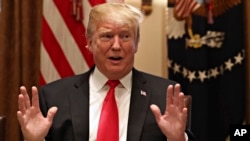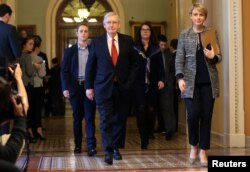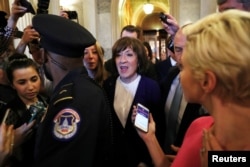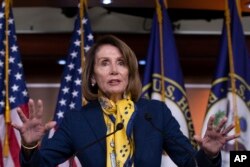President Donald Trump said Thursday that he would accept a deal to at least temporarily reopen the federal government if it contained a "pro-rated down payment" on the U.S.-Mexico border wall he has sought for two years.
Trump told reporters at the White House the country had no choice but to build a wall to keep out what he said was a "virtual invasion" by criminals, human traffickers and drugs.
Trump said he blamed himself for the large number of immigrants who want to enter the United States, crediting himself for a strong economy and what he said was a record number of people employed.
But he said anyone who wanted to come to the U.S. had to do so legally.
Senate bills rejected
Earlier Thursday, the Senate failed to end the shutdown — the longest in U.S. history — when it voted down two competing proposals that would have ended the 34-day impasse over funding for the wall.
A Republican measure incorporating Trump's $5.7 billion request for wall construction, in addition to limited immigration reforms and government funding through the current fiscal year, failed to advance by a 50-47 vote.
Senate Majority Leader Mitch McConnell of Kentucky had called the Republican bill, "a pragmatic compromise that could end this impasse right away. The choice is absolutely clear and the nation is watching."
McConnell emphasized that the Republican plan was the only one that would have received the president's signature. But Senate Democrats pushed back against the White House offer.
"If it were a compromise, the president would have talked to us about it," said Sen. Tim Kaine, D-Va. He went on to say that policy disagreements over immigration could be worked out, but "the difference that's hard to resolve is a party and a president who believe in government shutdowns."
A Democratic proposal went down by a vote of 52-44, despite getting six Republican votes. The measure contained no border security or immigration provisions and was designed to reopen shuttered federal agencies and provide a two-week window for congressional leaders and the White House to negotiate a deal on immigration.
Both proposals required 60 votes to advance in the 100-member chamber. Republicans have a 53-47 Senate majority.
Congressional action has not been limited to the Senate. The Democrat-led House of Representatives has passed multiple bills restoring federal spending authority but omitting wall funding from all of them.
A growing number of lawmakers of both parties have said compromise is the only way to end the political stalemate and reopen the government.
"It is long overdue for all sides to come together, to engage in constructive debate and compromise to end this standoff," Maine Republican Sen. Susan Collins said. "Shutdowns represent the ultimate failure to govern and should never be used as a weapon to achieve an outcome."
Some missing 2nd paycheck
The shutdown has furloughed 800,000 government employees, with at least 420,000 forced to continue working without pay and the remainder sent home. Some of them have been forced to look for temporary work elsewhere to help pay their household bills. All are set to miss their second biweekly paycheck on Friday.
Some government services have been curtailed. About 10 percent of airport security agents ordered to work have instead called in sick, some food inspections have been cut back, and museums and parks are closed. Federal courts could run out of money by the end of the month.
Trump said he understood that people need to keep their pantries full. He said he "loves and respects" federal workers and appreciated the work they do.
But he did not try to explain a comment Thursday by Commerce Secretary Wilbur Ross.
Ross, who is a multimillionaire, told CNBC television he could not understand why a furloughed federal worker would have to turn to a food bank for help when he could simply take out a loan from a bank or credit union.
"So there really is not a good excuse why there should be a liquidity crisis," Ross said. "Now, true, the people might have to pay a little bit of interest, but the idea that it's paycheck or zero is not a really valid idea."
His remarks followed those by Trump's daughter-in-law, Lara, who said Wednesday that missed paychecks and empty wallets caused "a little bit of pain."
"But it's going to be for the future of our country, and their children and their grandchildren and generations after them will thank them for their sacrifice right now," she said. "But the president is trying every single day to come up with a good solution here, and the reality is it's been something that's gone on for too long and been unaddressed — our immigration problem."
House Speaker Nancy Pelosi, a California Democrat, said the comments reflected a "let-them-eat-cake attitude."












